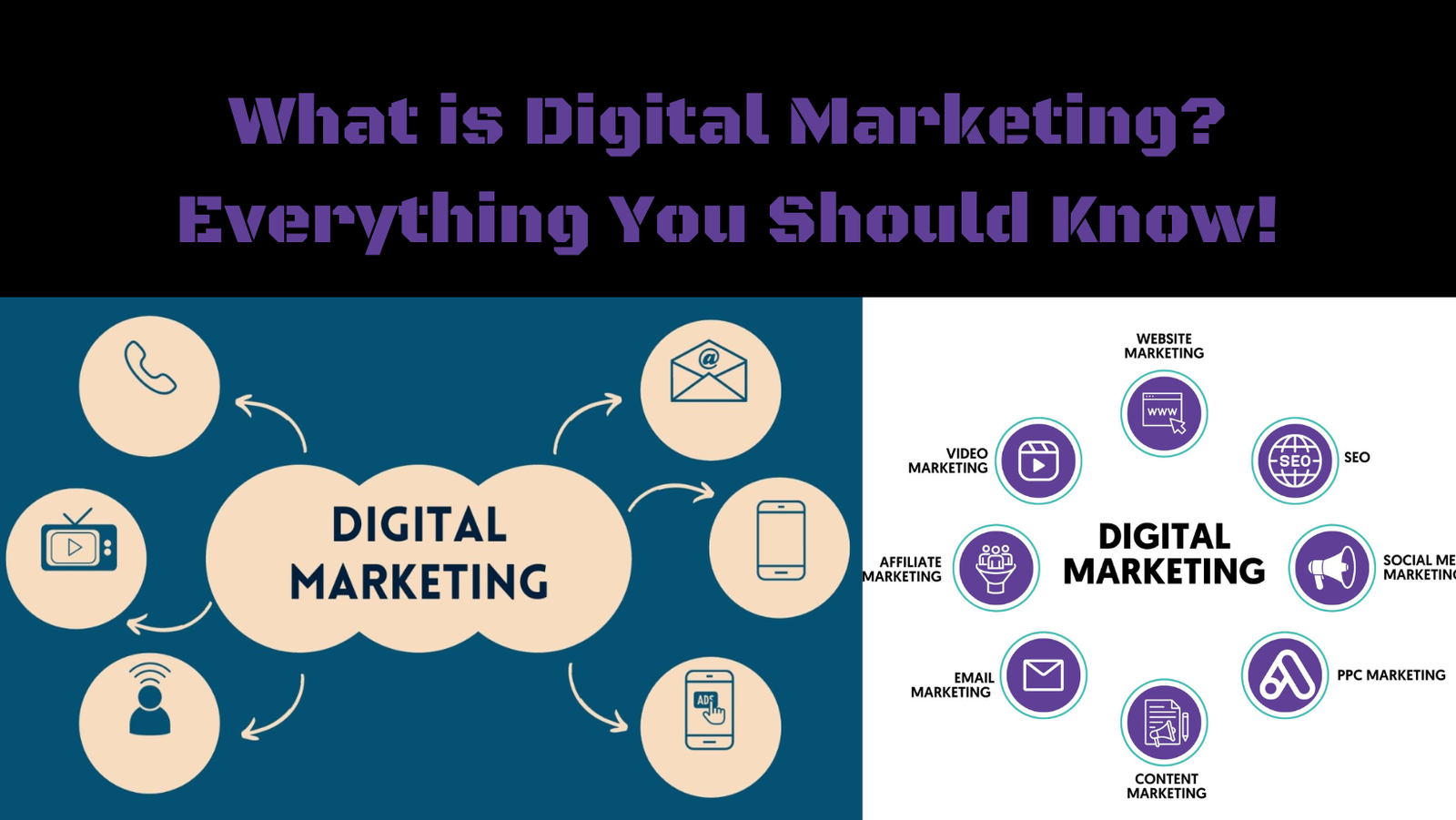Digital marketing has become an indispensable part of a business’s ability to reach, engage, and convert customers online.
This comprehensive guide will explore the multifaceted aspects of digital marketing, its importance in the modern business landscape, and effective strategies for success.
Introduction to Digital Marketing
Definition and Scope
Digital marketing refers to the promotion of products or services using digital channels to reach consumers. This form of marketing utilizes the internet and online-based technologies, such as desktop computers, mobile phones, and other digital media and platforms to promote products and services.
Evolution of Digital Marketing
The evolution of digital marketing is closely tied to the advancement of technology. From the early days of the internet to the rise of social media and mobile apps, digital marketing strategies have had to adapt to the changing landscape of consumer interaction and technology use.
Key Components of Digital Marketing
Search Engine Optimization (SEO)
In the realm of digital marketing, Search Engine Optimization (SEO) stands as a powerful technique for boosting a website’s prominence within search engine results.
By strategically crafting and optimizing website content, SEO enhances a site’s visibility, attracting a greater influx of visitors through organic searches rather than paid methods.
On-Page SEO
In the world of Search Engine Optimization (SEO), on-page SEO specifically refers to fine-tuning the elements that make up a web page to improve its ranking in search results. This involves optimizing the content itself, the underlying HTML code that structures the page, and even the images to enhance a website’s visibility for relevant searches.
Off-Page SEO
Off-page SEO goes beyond the confines of your website, focusing on external factors that influence search engine perception. This includes strategies like building backlinks, which are essentially votes of credibility from other websites, and social media engagement, where positive online buzz can boost your site’s authority.
Content Marketing
In the realm of marketing, content marketing shines as a strategic approach. It revolves around crafting and consistently sharing valuable, relevant content that resonates with a target audience.
This method isn’t about pushing sales pitches, but rather attracting and retaining customers by providing them with informative and helpful content. By establishing yourself as a source of knowledge, you build trust and brand awareness, ultimately making your business the one that comes to mind when your target audience needs what you offer.
Types of Content
The digital landscape thrives on engaging content, and creators have a wealth of formats to choose from. Blog posts and articles offer in-depth written explorations, while videos and infographics captivate audiences with moving visuals and easily digestible data.
For lengthier dives into specific topics, ebooks provide comprehensive information, and webinars create interactive learning experiences that foster audience connection.
Social Media Marketing
In the dynamic world of social media marketing, businesses harness the power of platforms like Facebook, Instagram, Twitter, and LinkedIn to strategically share content and cultivate a loyal following.
This approach fosters engagement, ignites brand awareness, and ultimately steers users towards a brand’s goals, be it website traffic, increased sales, or a community of enthusiastic brand advocates.
Strategies for Engagement
The key to fostering engagement lies in a three-pronged approach: consistent content creation, interactive elements that spark participation, and strategic promotion through targeted advertising. By regularly posting fresh content, you keep your audience interested and coming back for more.
Interactive elements like polls, quizzes, or contests encourage active involvement, fostering a sense of community. Finally, leveraging paid advertising campaigns expands your reach, attracting new followers and reigniting interest among existing ones. This multifaceted approach ensures you stay connected and engaged with your audience.
Email Marketing
Leveraging email for targeted marketing, email marketing allows businesses to connect directly with potential and current customers through permission-based messaging.
This strategy fosters relationships by delivering promotional content, industry insights, or informative updates, all designed to cultivate brand awareness and drive conversions.
Components of a Successful Email Campaign
Craft compelling email campaigns that resonate with your audience by incorporating personalization for a tailored touch, ensuring a mobile-friendly design for on-the-go engagement, and featuring clear calls-to-action that guide recipients towards the desired outcome, all in one concise email.
Pay-Per-Click (PPC) Advertising
In the world of online marketing, Pay-Per-Click (PPC) advertising offers a targeted approach where advertisers are charged only when users click on their ads. This makes PPC a results-oriented strategy, popularized by platforms like Google Ads, that allows businesses to reach potential customers actively searching for what they offer.
Affiliate Marketing
In affiliate marketing, businesses partner with affiliates, who are essentially promoters, to reach new audiences. Affiliates earn commissions by advertising the business’s products or services, and are rewarded based on their success in driving traffic, leads, or sales through their marketing efforts.
This performance-based approach benefits both parties: businesses gain access to a wider market without upfront costs, and affiliates earn income by leveraging their marketing skills and audience reach.
Measuring Digital Marketing Success
Key Performance Indicators (KPIs)
Key Performance Indicators (KPIs) are the metrics that track a business’s health and progress towards its goals. These can include conversion rates, which measure how effectively a business turns leads into customers; return on investment (ROI), which shows the financial benefit of an action; and customer acquisition cost (CAC), which reveals how much it costs to acquire a new customer.
By monitoring these KPIs, businesses can identify areas for improvement and make data-driven decisions to optimize their performance.
Tools and Technologies
In the digital marketing world, a powerful trio exists to optimize your online presence: Google Analytics, SEMrush, and HubSpot. Google Analytics provides the foundation, tracking website visitor behavior and offering insights into user journeys. SEMrush builds upon this knowledge, analyzing competitor strategies and identifying valuable keywords to elevate your search engine ranking.
Finally, HubSpot ties everything together, allowing you to manage content, nurture leads, and convert website visitors into customers. By utilizing these tools strategically, you can gain a data-driven understanding of your audience, craft targeted campaigns, and achieve your marketing goals.
Integrating Digital Marketing Channels
Multi-Channel Approach
A multi-channel approach breaks down communication silos by utilizing various channels to reach a broader audience. This strategic outreach fosters deeper engagement by meeting customers on their preferred platforms, ultimately creating a more comprehensive and impactful brand experience.
Importance of a Unified Strategy
A unified strategy acts like a conductor in an orchestra, harmonizing the different platforms your organization uses. This ensures a consistent message reaches your audience, regardless of whether they encounter you on social media, through email marketing, or on your website. This consistency strengthens your brand identity and makes you more recognizable in a crowded marketplace.
Challenges in Digital Marketing
Keeping Up with Technology
The ever-evolving landscape of digital technology demands marketers to be nimble learners, constantly absorbing new information and adjusting their strategies to stay ahead of the curve.
Data Privacy and Security
As regulations like GDPR come into effect, the way marketers handle consumer data is undergoing a critical shift. This newfound emphasis on data privacy requires marketers to prioritize obtaining user consent, implementing secure storage practices, and potentially rethinking how they leverage data for targeted campaigns.
High Competition
The digital landscape is experiencing a boom as more businesses set up shop online, intensifying competition for customer attention and loyalty. This surge in competition means companies need to develop strong online presences that effectively attract and retain customers.
Check Similiar Guide: How do you Earn Money on GTA 5 Online?
Conclusion:
Digital marketing is a dynamic and vital field that enables businesses to connect with customers in unprecedented ways. By understanding and leveraging different components and strategies of digital marketing, businesses can achieve greater visibility and engagement, leading to increased sales and customer loyalty.
As technology continues to evolve, so too will the strategies marketers employ, making agility and continuous learning key components of success in digital marketing.
This guide has aimed to provide a thorough understanding of digital marketing, equipping readers with the knowledge to implement effective digital marketing strategies. Whether you are a seasoned marketer or new to the field, staying updated with the latest trends and technologies is crucial for success.
Frequently asked Questions
What exactly is digital marketing?
Digital marketing encompasses all marketing efforts that leverage digital channels to connect with customers. This includes websites, social media platforms, search engines, email, mobile apps, and even digital elements of traditional media like TV commercials with QR codes.
How is digital marketing different from traditional marketing?
Traditional marketing focuses on offline channels like print ads, billboards, and TV commercials. Digital marketing offers greater measurability, allowing you to track campaign performance and adjust strategies in real-time. Additionally, digital marketing provides opportunities for direct interaction and engagement with your target audience.
Why is digital marketing important for businesses today?
Consumers spend a significant amount of time online. Digital marketing allows businesses to reach their target audience where they are already active. It also offers a more cost-effective way to reach a wider audience compared to traditional marketing methods.
What are some common digital marketing tactics?
There are numerous digital marketing tactics, including Search Engine Optimization (SEO) to improve website ranking in search results, Social Media Marketing (SMM) to connect and engage with customers on social platforms, Content Marketing to create valuable content that attracts and educates potential customers, and Email Marketing to nurture leads and build customer relationships.
Do I need a big budget for digital marketing?
The beauty of digital marketing is its scalability. You can start small with organic social media campaigns and content marketing, and gradually increase your budget as you see success. Many effective tactics don’t require a hefty investment, but focus on creativity and strategic planning.
How can I measure the success of my digital marketing campaigns?
Most digital marketing platforms offer built-in analytics that allow you to track key metrics like website traffic, engagement rates, conversion rates, and return on investment (ROI). By analyzing this data, you can gauge the effectiveness of your campaigns and make data-driven decisions for future strategies.
Is digital marketing constantly evolving?
Yes, digital marketing is a dynamic field that keeps pace with evolving technologies and consumer behavior. New platforms emerge, and existing ones update their features regularly. Staying informed about these trends is crucial for success in the digital marketing landscape.
Where can I learn more about digital marketing?
Numerous online resources offer valuable information on digital marketing. Industry blogs, social media groups, online courses, and certifications can equip you with the knowledge and skills you need to succeed in this exciting field.
Do I need to hire a digital marketing agency?
Hiring a digital marketing agency can be beneficial if you lack the in-house expertise or resources to manage your campaigns effectively. Agencies can provide a comprehensive range of services, from strategy development to campaign execution and performance measurement.
What are some of the future trends in digital marketing?
The future of digital marketing is likely to see increased personalization, with content and offers tailored to individual customer preferences. Artificial intelligence (AI) will play a more prominent role in campaign automation and data analysis. Additionally, the rise of voice search and the growing popularity of augmented reality (AR) and virtual reality (VR) are expected to influence future marketing strategies.


